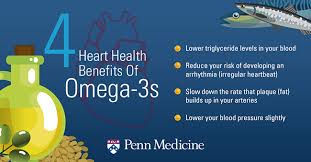
Omega 3 and heart disease prevention
Omega 3 is an essential fatty acid that is not formed in the body, as it must be obtained from external sources. The richest of these sources are salmon, sardines, tuna, and flax oil, or as the Egyptians call it hot oil, which they add to fava beans, then almond oil, cod liver oil, canola oil, and fava bean oil. Soy.
What is the role of omega-3 acids in reducing the risk of heart disease and general health?
A recent study indicated that only grilled or roasted fish protects humans from heart disease. Scientists believe that most types of fried fish contain small amounts of omega-3 fatty acids, the active substance for heart and arterial health in fish.
The role of this acid for the health of the heart and arteries is that these acids:
1- Prevents the occurrence of stroke and atherosclerosis.
2- Anti-inflammatory and reduces blood pressure
3- One of the best medicines to reduce the level of triglycerides in the blood T.G.
4- It has been proven that large doses of these acids reduce platelet aggregation, which contributes to blood dilution.
5- These acids have been proven to reduce inflammation and thus protect against heart disease.
6- With regard to cancer, studies have found that adding oils rich in omega-3 acids to the diets of mice led to reducing the proliferation and growth of cancer cells. It was also found that the efficiency of chemotherapy in treating cancer is better and higher among patients who take large doses of omega-3.
Finally, scientists explained in the Journal of Nutritional Biochemistry that omega-3 fatty acids are associated with better bone indicators in the blood and higher bone mineral density in the absence of estrogen, indicating that greater consumption of omega-6 acids leads to increased production of compounds responsible for bone loss and thinning.
Too much is harmful
These acids are considered among the medications that healthy people should not take in large quantities, as they have little role in preventive medicine.
Studies have shown that eating too much of it reduces the lymphocytes responsible for acquired immunity, thus weakening the body’s resistance and helping it easily contract some diseases. Perhaps this is the main reason for the spread of an Egyptian-Sudanese custom that prevents a person suffering from a cold and influenza from eating fish due to the belief that the person suffering from a cold will get worse. If he eats fish.
Individual needs for omega 3
The American Heart Organization explained the following:
1- People at risk of heart disease should eat fish or fish oils twice a week, as well as vegetable oils rich in omega-3 acids, such as soybean, canola, and flax oil.
2- Patients with cardiovascular disease should take 1g daily of essential fatty acid Omega-3, preferably from fresh fish oil, as there are some scientists who doubt any therapeutic benefit of these acids if taken in the form of pharmaceutical preparations, so they must be obtained directly from fish. Especially grilled ones.
3- Heart patients who suffer from high levels of triglycerides in the blood should take 2-4 grams of the above two acids. They can be taken in the form of tablets and under medical supervision.
4- Healthy people need much smaller quantities, and it is recommended that the individual not eat fish more than once a week






